

HVAC Services
Get Professional Repairs From The Area's Trusted HVAC Technicians. Ask About Our Services! We Offer Professional Heating & Cooling System Repairs And Guarantee Long-Lasting Results.
Got Question? Call us: (850) 678-2665Financing
Certifications and Training in the HVAC Industry
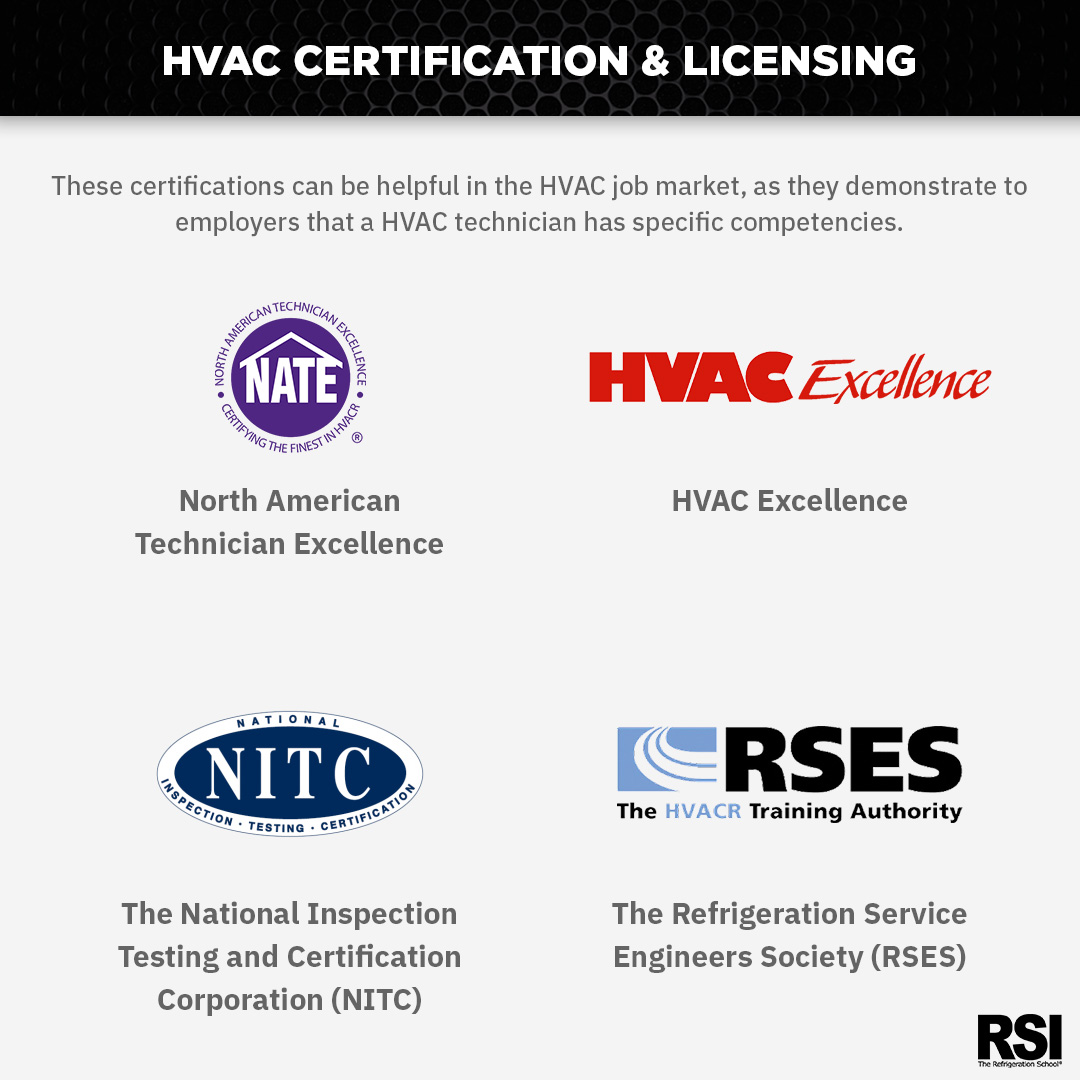
Are you considering a career in the HVAC industry? If so, it’s essential to understand the importance of certifications and training in this field. With the increasing demand for skilled HVAC technicians, having the right certifications can give you a competitive edge in the job market. Whether you’re just starting or looking to advance your career, obtaining industry-recognized certifications can validate your knowledge and skills, making you a more valuable asset to potential employers. In this article, we will explore the significance of certifications and training in the HVAC industry and how they can help you excel in your career.
Certifications and Training in the HVAC Industry
When it comes to working in the HVAC industry, obtaining the right certifications and undergoing proper training is crucial. Not only does this ensure that you have the necessary skills and knowledge to excel in your field, but it also provides credibility and increases your chances of career advancement. In this comprehensive article, we will delve into various types of certifications, including NATE Certification, EPA Certification, HVAC Excellence Certification, AHRI Certification, and other industry-specific certifications. We will also discuss the importance of proper training and explore different training options available to aspiring HVAC professionals.
1. Types of Certifications
1.1 NATE Certification
NATE Certification, or North American Technician Excellence Certification, is widely recognized as the gold standard in the HVAC industry. It demonstrates a technician’s proficiency and expertise in various areas of HVAC systems. With NATE Certification, you can become a trusted professional who possesses the skills necessary to provide top-notch service to customers.
1.2 EPA Certification
EPA Certification, or Environmental Protection Agency Certification, is essential for any technician who handles refrigerants. This certification ensures that technicians can safely handle, recover, and dispose of refrigerants in compliance with EPA regulations. It plays a vital role in protecting the environment and preventing harmful substances from being released into the atmosphere.
1.3 HVAC Excellence Certification
HVAC Excellence Certification is another highly recognized certification within the HVAC industry. It focuses on assessing a technician’s skills and knowledge in various areas, including installation, maintenance, and repair of HVAC systems. HVAC Excellence Certification helps technicians stand out from the competition and showcases their commitment to professionalism and excellence.
1.4 AHRI Certification
AHRI Certification, or Air-Conditioning, Heating, and Refrigeration Institute Certification, is specifically designed for manufacturers and contractors. It verifies the performance ratings of HVAC equipment and ensures that products meet industry standards. AHRI Certification provides confidence to customers, knowing that the equipment they purchase meets the stringent requirements set by the industry.
1.5 Other Industry-Specific Certifications
In addition to the aforementioned certifications, there are several other industry-specific certifications available. These certifications cater to specific niches within the HVAC industry, such as solar heating, geothermal systems, and commercial refrigeration. These certifications offer technicians the opportunity to specialize in specific areas and expand their knowledge base, making them even more valuable assets in the HVAC field.
2. NATE Certification
2.1 Overview
NATE Certification is renowned for its credibility and rigor. It showcases a technician’s proficiency in installation, maintenance, and repair of HVAC systems. NATE Certification is a highly sought-after qualification that is recognized and preferred by employers and customers alike.
2.2 Eligibility
To be eligible for NATE Certification, technicians must possess at least two years of verifiable experience in the HVAC industry. This experience can be acquired through a combination of formal HVAC training and on-the-job experience. It is important to note that while experience is a requirement, it is not necessary to complete specific HVAC training courses.
2.3 Exam Format
The NATE Certification exam consists of both written and practical components. The written exam evaluates a technician’s knowledge and understanding of concepts related to HVAC systems. The practical exam assesses a technician’s ability to apply their knowledge and skills to real-world scenarios.
2.4 Exam Content
The NATE Certification exam covers a wide range of topics, including electrical fundamentals, air conditioning, heating, heat pumps, and air distribution. Technicians are tested on their ability to diagnose problems, perform repairs, and ensure the proper functioning of HVAC systems.
2.5 Renewal and Continuing Education
NATE Certification is valid for two years. To renew their certification, technicians must fulfill continuing education requirements. This ensures that technicians stay up-to-date with the latest industry advancements and maintain their competency in the field.
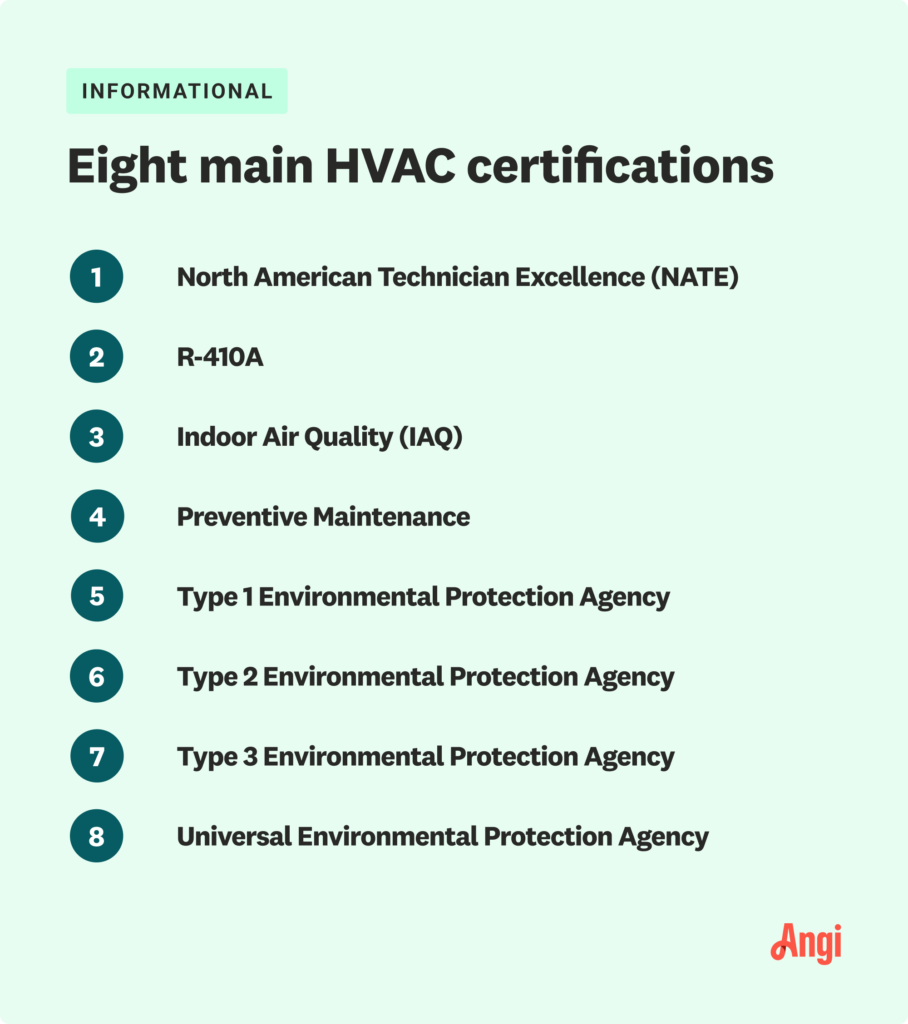
This image is property of s3media.angieslist.com.
3. EPA Certification
3.1 Purpose and Importance
EPA Certification is essential for technicians working with refrigerants. The purpose of EPA Certification is to ensure that technicians have the necessary knowledge and skills to handle refrigerants safely and minimize their impact on the environment. EPA Certification is a legal requirement, and without it, technicians are prohibited from working with refrigerants.
3.2 Types of EPA Certifications
There are different types of EPA Certifications depending on the type of refrigerant being handled. The most common type is the EPA 608 Certification, which is divided into three levels: Type I, Type II, and Type III. Each level corresponds to a specific type of refrigerant and covers different aspects of handling and servicing these refrigerants.
3.3 Study Materials and Training Resources
To prepare for the EPA Certification exam, technicians can access a variety of study materials and training resources. These include study guides, practice exams, online courses, and in-person training sessions. By utilizing these resources, technicians can enhance their understanding of refrigerant handling practices and increase their chances of success in the exam.
3.4 Exam and Certification Process
The EPA Certification exam consists of multiple-choice questions that assess a technician’s knowledge of refrigerant handling practices, regulations, and safety precautions. Once technicians pass the exam, they receive their EPA Certification, which is valid for life. However, it is important to note that the EPA requires technicians to keep a record of their continuing education hours to ensure ongoing competence.
4. HVAC Excellence Certification
4.1 Benefits of HVAC Excellence Certification
HVAC Excellence Certification is highly regarded within the industry and offers numerous benefits to certified technicians. This certification demonstrates a technician’s commitment to professionalism, excellence, and ongoing education. It distinguishes certified individuals as reputable and highly competent HVAC professionals.
4.2 Certification Levels
HVAC Excellence Certification is available at different levels, allowing technicians to showcase their proficiency in specific areas of HVAC systems. The levels include Residential Air Conditioning, Residential Heating, Light Commercial Air Conditioning, Light Commercial Refrigeration, and Heat Pump Service.
4.3 Exam Topics and Formats
The HVAC Excellence Certification exams cover a broad range of topics, including electrical systems, refrigeration, air distribution, heat pumps, and system design. The exams consist of multiple-choice questions that test a technician’s knowledge, problem-solving abilities, and practical application of HVAC principles.
4.4 Renewal and Recertification
HVAC Excellence Certification is valid for five years. To maintain their certification, technicians must earn a specified number of continuing education units (CEUs) during this period. This ensures that certified technicians stay updated with the latest industry trends and maintain their knowledge and skills at a high level.
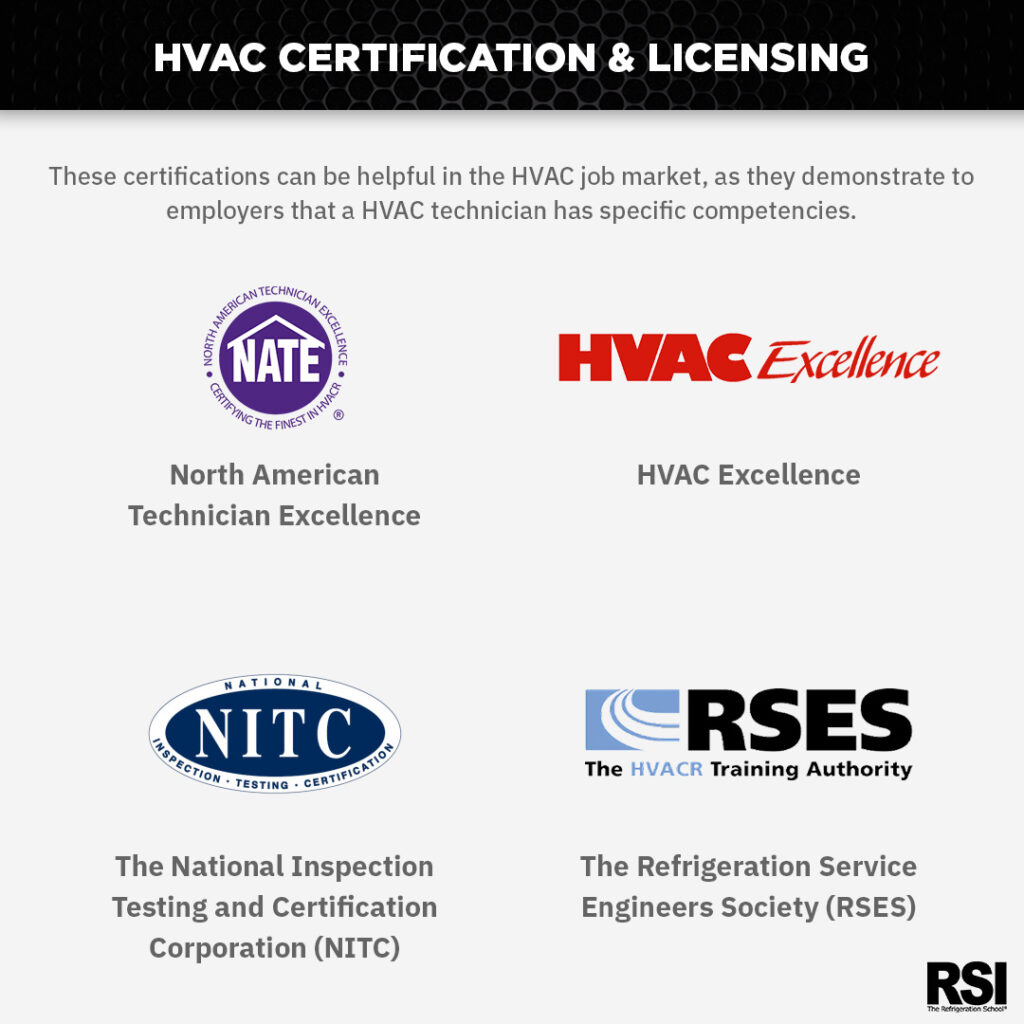
This image is property of www.rsi.edu.
5. AHRI Certification
5.1 AHRI Certification Programs
AHRI offers several certification programs that focus on verifying the performance of HVAC equipment and systems. These programs include the Central Air Conditioner and Heat Pump Certification Program, the Commercial HVAC Program, and the Water-Source Heat Pump Certification Program. AHRI Certification programs provide credibility to manufacturers and contractors, assuring customers that the equipment they purchase meets industry standards.
5.2 Benefits for Manufacturers and Contractors
AHRI Certification offers numerous benefits to manufacturers and contractors. It provides third-party verification of equipment performance, ensuring that products meet industry standards and perform as advertised. AHRI Certification also gives manufacturers a competitive edge in the market by demonstrating compliance with the highest quality and performance standards.
5.3 Certification Process
The AHRI Certification process involves rigorous testing and evaluation of HVAC equipment. Manufacturers must submit their equipment to independent testing laboratories accredited by AHRI. These laboratories conduct various tests to assess the performance and efficiency of the equipment. Upon successful completion of the testing process, the equipment is granted AHRI Certification.
6. Other Industry-Specific Certifications
6.1 Overview of Other Certifications
In addition to the well-known certifications mentioned earlier, there are several other industry-specific certifications available within the HVAC industry. These certifications cater to specific niches or specialized areas, such as solar heating, geothermal systems, and commercial refrigeration. They provide technicians with the opportunity to enhance their knowledge and skills in specific fields, making them highly valuable assets to employers.
6.2 Notable Certifications in HVAC Industry
Some notable industry-specific certifications include the Solar Thermal Installer Certification, Geothermal Heat Pump Accreditation, and Commercial Refrigeration Certification. These certifications demonstrate a technician’s expertise in their respective fields while addressing the evolving needs and demands of the HVAC industry.
6.3 Specialized Certifications for HVAC Technicians
Specialized certifications, such as those for building automation systems, energy auditing, and indoor air quality management, allow technicians to diversify their skill sets and open new career paths. These certifications showcase a technician’s ability to handle advanced technologies and address specific challenges faced in the HVAC industry.
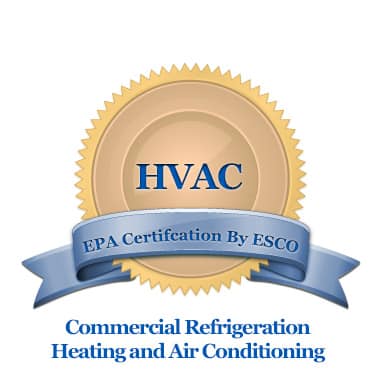
This image is property of lamson.edu.
7. Importance of Proper Training
7.1 Ensuring Safety and Quality
Proper training in the HVAC industry is crucial for ensuring the safety and quality of work. HVAC systems involve complex components and require precise installation, maintenance, and repair techniques. Without proper training, technicians may compromise safety standards, leading to hazards for both themselves and customers. Inadequate training can also result in subpar workmanship, causing inefficiencies and recurring issues in HVAC systems.
7.2 Continuous Learning and Skill Development
The HVAC industry is constantly evolving with advancements in technology, regulations, and best practices. Proper training allows technicians to stay current with these changes and continuously upgrade their knowledge and skills. Continuous learning not only ensures technicians remain competitive in the job market but also enhances their ability to provide excellent service to customers.
7.3 Compliance with Regulations and Standards
The HVAC industry is subject to various regulations and standards that govern the installation, maintenance, and repair of HVAC systems. Proper training equips technicians with the knowledge and understanding of these regulations, ensuring compliance and adherence to industry standards. By staying informed and well-trained, technicians can avoid legal issues and maintain a high level of professionalism.
8. Training Options
8.1 Trade Schools and Vocational Programs
Trade schools and vocational programs offer comprehensive training in HVAC systems. These programs typically cover fundamental concepts, practical skills, and hands-on training. Trade schools and vocational programs provide a structured learning environment and often have industry partnerships to facilitate job placement after completion of the program.
8.2 Apprenticeships
Apprenticeships provide aspiring HVAC technicians with the opportunity to learn on the job while receiving guidance from experienced professionals. This hands-on training method allows apprentices to apply their knowledge in real-world scenarios and develop practical skills. Apprenticeships are a valuable stepping stone into the HVAC industry and provide a solid foundation for a successful career.
8.3 Online Training Courses
Online training courses offer flexibility and convenience for individuals who may have other commitments or prefer self-paced learning. These courses cover a wide range of HVAC topics and provide interactive modules, quizzes, and video demonstrations. Online training courses are an excellent option for those seeking to enhance their skills or obtain specific certifications while accommodating their own schedule.
8.4 Manufacturer-Sponsored Training Programs
Many HVAC equipment manufacturers offer training programs that focus on their specific products and technology. These programs provide in-depth knowledge about the manufacturer’s equipment, installation procedures, and maintenance requirements. Manufacturer-sponsored training programs not only help technicians understand and service their products effectively but also enhance their marketability in the industry.
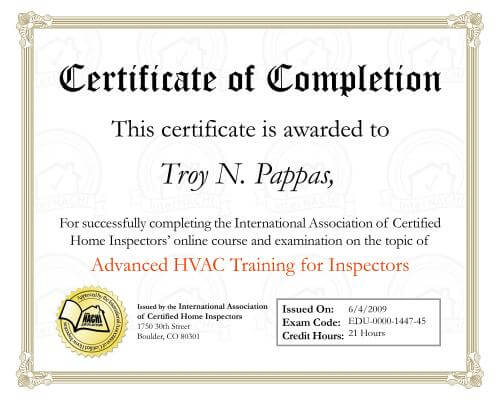
This image is property of cdn.vocationaltraininghq.com.
9. Choosing the Right Training Program
9.1 Accreditation and Recognition
When selecting a training program, it is crucial to ensure that the program is accredited and recognized by industry authorities. Accredited programs adhere to high-quality standards and have undergone rigorous evaluations. By choosing an accredited program, you can be confident that you will receive quality education and training that is recognized and respected by employers.
9.2 Curriculum and Course Offerings
Evaluate the curriculum and course offerings of different training programs to determine if they align with your career goals and interests. Look for programs that cover a comprehensive range of topics and provide hands-on training opportunities. A well-rounded curriculum will equip you with the knowledge and skills needed to excel in the HVAC industry.
9.3 Real-World Experience and Hands-On Training
Hands-on training and real-world experience are vital components of an effective HVAC training program. Look for programs that provide ample opportunities for practical application of skills through lab work, simulations, or real-life scenarios. This experiential learning is invaluable in developing the confidence and proficiency necessary for success in the field.
9.4 Instructor Qualifications
The qualifications and experience of instructors at a training program play a significant role in the quality of education and training you will receive. Research the credentials, industry experience, and teaching background of the instructors to ensure they possess the necessary expertise to guide and mentor you throughout your training journey.
9.5 Job Placement Assistance
Consider programs that offer job placement assistance or have partnerships with local HVAC companies. This support can greatly enhance your chances of securing employment after completing the program. Job placement assistance may include resume building, interview preparation, and networking opportunities with industry professionals.
10. Continuing Education and Professional Development
10.1 Importance of Continuing Education
Continuing education is crucial for HVAC professionals to stay current with advancements in technology, regulations, and best practices. It enables technicians to expand their knowledge, enhance their skills, and remain competitive in the ever-changing HVAC industry. Continuing education also demonstrates a commitment to professional growth and ongoing learning.
10.2 Continuing Education Requirements for Certifications
Most certifications in the HVAC industry have renewal requirements that include completing a designated number of continuing education hours. These requirements vary depending on the certification and aim to ensure that certified technicians maintain their competency and stay updated with industry developments. By fulfilling these requirements, technicians can retain their certifications and continue to excel in their careers.
10.3 Professional Development Opportunities
Beyond the mandatory continuing education requirements, HVAC professionals have numerous opportunities for further professional development. This can include attending industry conferences, workshops, and seminars; joining professional organizations; pursuing advanced certifications; or participating in online webinars and courses. Engaging in ongoing professional development allows technicians to broaden their skill sets and explore new areas of specialization.
In conclusion, certifications and training are vital components of a successful career in the HVAC industry. Obtaining certifications such as NATE Certification, EPA Certification, HVAC Excellence Certification, and AHRI Certification demonstrates expertise, professionalism, and dedication to providing top-quality service to customers. Proper training equips technicians with the necessary knowledge and skills to excel in their roles, ensures compliance with regulations and standards, and enables continuous learning and career advancement. By choosing the right training program and pursuing ongoing professional development, HVAC professionals can stay at the forefront of the industry and achieve long-term success.
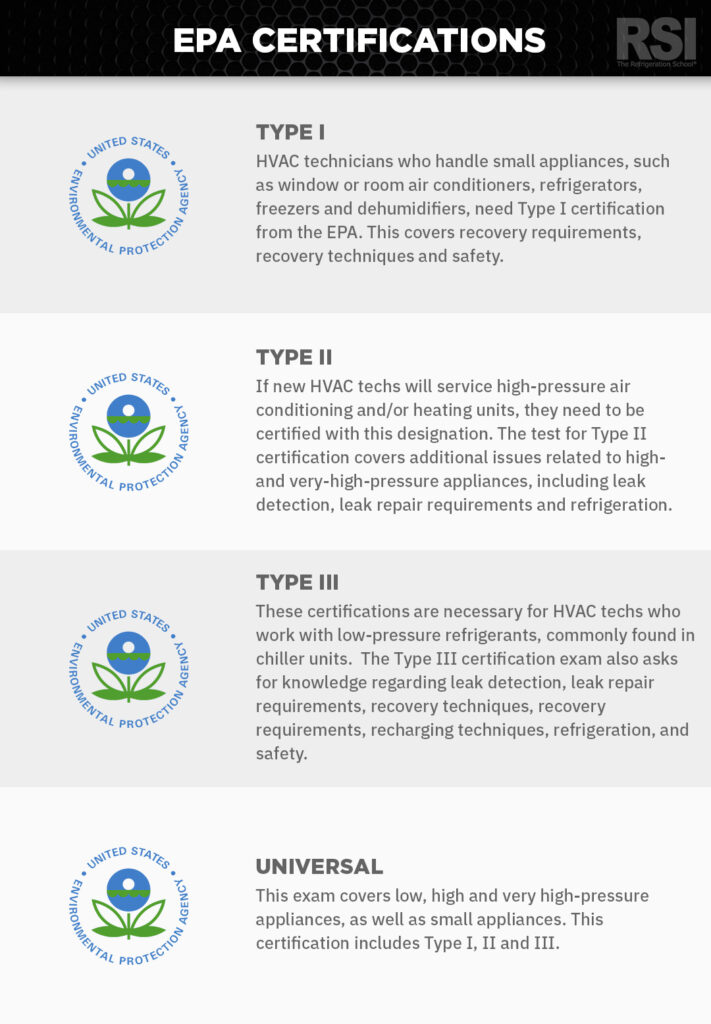
This image is property of www.rsi.edu.

